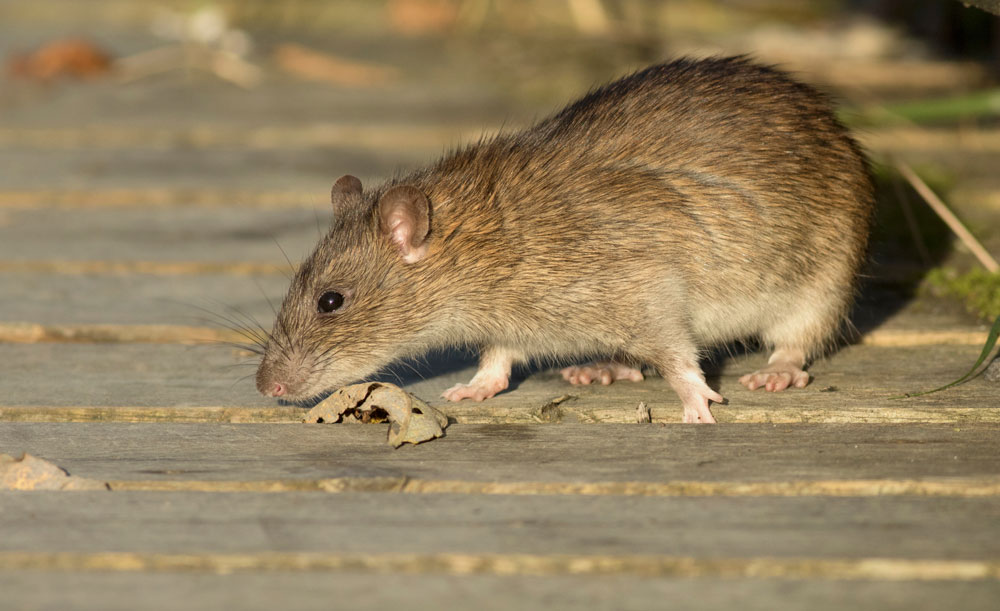No one wants rats in or around their home. Rats can expose you and your family to serious disease and harmful bacteria through their urine or feces, and often harbor and spread ticks, fleas and mites.
Yuck.
Some estimates say rats eat 20 to 40 pounds of food a year, and contaminate 10 times that amount of food with their urine and feces. In one year, a single rat can produce around 25,000 droppings.
Double yuck.
If you suspect a rat infestation in your home or yard, call Pestop immediately. But first, here’s a little information that will help you get to know our friend, the Norway rat, a little better.
For whatever reason, the Norway rat has many names. They’re often called simple names like the common rat, brown rat, street rat or sewer rat. But they’re also known more colorfully as the Hanover rat, Norway rat, Norwegian rat, Parisian rat, wharf rat or water rat.
No matter what you call them, they’re rats. And they’re not something you want around your home and family.
Norway rats are covered in brown or gray shaggy fur, and can grow up to 11 inches from the tip of their nose to the back end of their body. Their tail is slightly shorter than their body and is semi-furless, pink or tan in color, and covered in scales. These rodents have a blunt nose and small, close-set, scaly ears. They usually weigh anywhere from about 5 ounces to a little over a pound, and are the most common rat in Europe and North America. Like most rats, the Norway rat lives mainly near human habitation.
What signs indicate a possible rat infestation?
Disgustingly, rat droppings are one of the most obvious signs of trouble. Other indications are dark, greasy-looking stains on areas where rats may have traveled (also disgusting); gnaw marks on food items or things like utility lines or wires; and, obviously, actually spotting them hanging around your home or yard.
How do rats get in to your space?
Rats can work their way into your home through holes as small as half an inch and will CHEW ON YOUR HOUSE to enlarge a hole. Gaps under exterior doors or around warped crawlspace doors, holes for utility and plumbing lines, and wall and foundation vents are their most common points of entry. They can also burrow their way into your home by digging, especially into older and poorly maintained structures, and they especially love yards with thick shrubbery; gardens; and deep, uncut grass.
Rats are nocturnal, so you’ll rarely see them in your yard during the day unless they’re driven out by a disturbance of some kind. They build their colonies near water sources, and enter buildings looking for food. You can often find them living in your attic, basement or crawlspace. Outside your home, they’re often found living in overgrown, weedy areas; sewers; in woodpiles and beneath buildings.
What can you do to prevent a rat infestation in your home or yard?
Rats love easy access to food. To help prevent these rodents from invading your space, be sure your garbage cans have tight, well-fitting lids and empty them regularly. Also keep any food items in sealed, rat-proof containers.
If you find a hole on the outside of your home that rats can squeeze through (remember, they can get through holes as small as a half inch), immediately stuff the hole with steel wool. Be sure to repair or close gaps around windows, doors and chimneys; keep doors and windows closed, especially at night; and trim away tree branches touching your home.
Do not store your woodpile close to your home.
Pet food and bird seed are extremely attractive to rats, so keep both in sealed containers. Do not leave bird seed lying around underneath bird feeders, and clean up after your pet regularly.
Water sources are very important to rat colonies, so be sure to fix any water leaks in or around your home, including exterior spigots and dripping sprinklers. Also eliminate any outdoor containers holding water.
You have rats! What should you do about it?
If you think you have rats, you probably do. Eek! And you need to jump on a solution as soon as possible. Your best bet is to call Pestop—your “do-it-yourself” pest control solution—immediately. Pestop saves you money on all of your pest control needs and offers you professional strength products to get rid of these yucky, unwanted guests for good.

